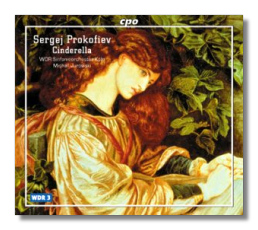
The Internet's Premier Classical Music Source
Related Links
- Prokofieff Reviews
- Latest Reviews
- More Reviews
-
By Composer
-
Collections
DVD & Blu-ray
Books
Concert Reviews
Articles/Interviews
Software
Audio
Search Amazon
Recommended Links
Site News
 CD Review
CD Review
Serge Prokofieff

Cinderella
- Complete Ballet Music, Op. 87
WDR Sinfonieorchester Köln/Michail Jurowski
CPO 999610-2 2CDs 40:40; 75:38
This is a fine Cinderella and must now be considered first choice among the complete accounts of this complex and rich score. What it lacks, though, is the very same thing all other recordings of the ballet fail to capture – the dark side of this "children's music." It isn't "children music", of course, but some musicologists have labeled it as such, others as light music. For all its fairy-tale wonder, its catchy tunes, its innocence and storybook romance, it's a ballet whose dark elements and acid are usually overlooked by conductors. Previn (EMI) managed to bring out some of the more sinister and disruptive elements, as heard in #4, The First Sister's Variation, and in #38, Midnight. But Jurowski isn't far off here, giving these numbers considerable character and color.
Rozhdestvensky captures the acid in the score better than anyone else. But then his style tended to be more abrasive in the 1960s, the decade he recorded this score for the scrappy Melodiya. Jurowsky's Dancing Lesson, #7, doesn't have the bite of Rozhdestvensky's, but it doesn't lack color, either, and overall certainly stands up well against the rest of the competition. In that group of competitors we have the very smooth Pletnev, with a reading on Deutsche Grammophon that may be closest in spirit and style to Jurowski's. But Jurowski's is ultimately better, both because his is subtler in his overall treatment of the score and because his orchestra, the supposedly second-tier WDR Symphony Orchestra of Cologne, outclasses Pletnev's Russian National Orchestra. Pletnev, despite certain deficiencies, was my previous favorite in this work.
Ashkenazy might have been the best choice in the past: after all, he had the highly-touted Cleveland Orchestra and delivered a quite incisive reading of the score. Too bad he was sabotaged by sound reproduction that highlighted that damned bass drum almost as though it were a solo instrument in the score. It is difficult to fathom that Decca's engineers let that dreadful taping pass muster.
In the end, this Jurowski reading is intelligent, full of drama and color, and well played by the orchestra. The conductor's consistency throughout demonstrates that his grasp of Prokofieff's conflicting elements is quite compelling. He doesn't overplay the lighter moments in the score and even captures some of the darker ones to convincing effect. Try his Midnight. Moreover, he's generally alert to the changing moods and brilliant colors in the score. I only wish he had imparted less a sense of vigor and brightness and more a one of the sinister and dark. I would never contend that this work is the balletic counterpart of Prokofieff's 1920s operatic masterpiece, The Fiery Angel, but I must assert that no other ballet by this great composer is as deceptive in its expressive language and mood swings as Cinderella. In short, this is a deeper work than it is usually given credit for.
The copious album notes by cpo's Eckhard van den Hoogen are enlightening, as usual. The sound reproduction is vivid and full. In sum, this is a brilliant Cinderella, a first choice, even if it isn't definitive. Highest recommendations and a best recording rating until someone like Gergiev, I suppose, records this work. And even then…
Copyright © 2000, Robert Cummings



















